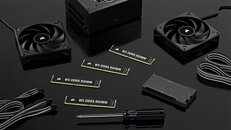- Joined
- Oct 9, 2007
- Messages
- 47,421 (7.51/day)
- Location
- Hyderabad, India
| System Name | RBMK-1000 |
|---|---|
| Processor | AMD Ryzen 7 5700G |
| Motherboard | ASUS ROG Strix B450-E Gaming |
| Cooling | DeepCool Gammax L240 V2 |
| Memory | 2x 8GB G.Skill Sniper X |
| Video Card(s) | Palit GeForce RTX 2080 SUPER GameRock |
| Storage | Western Digital Black NVMe 512GB |
| Display(s) | BenQ 1440p 60 Hz 27-inch |
| Case | Corsair Carbide 100R |
| Audio Device(s) | ASUS SupremeFX S1220A |
| Power Supply | Cooler Master MWE Gold 650W |
| Mouse | ASUS ROG Strix Impact |
| Keyboard | Gamdias Hermes E2 |
| Software | Windows 11 Pro |
Corsair today announced it is entering the DDR5 Workstation market with the introduction of a range of WS DDR5 RDIMM memory kits. Engineered to offer uncompromising performance and reliability, these ECC RDIMM kits redefine the capabilities of the newest workstations, and are compatible with the latest 4th Gen Intel Xeon and AMD Ryzen Threadripper 7000 processors.
This new range of memory kits boasts capacities of up to 256 GB, setting a new standard for memory-intensive tasks such as high-resolution media editing, 3D rendering, and AI training. Rigorously tested and carefully screened, these modules surpass JEDEC specifications with tighter timings and higher frequencies, ensuring optimal performance for the most demanding workloads.



The DDR5 registered DIMMs (RDIMMs) support Error Correction Code (ECC), enabling real-time error detection and correction for consistently reliable data processing. This commitment to stability caters to the needs of workstation users who rely on uninterrupted performance for their professional endeavors.
Achieving optimal performance is straightforward thanks to support for Intel XMP 3.0 and AMD EXPO. A few clicks to load the faster profile in the UEFI BIOS is all that's required to unleash incredible throughput on compatible hardware, making these DDR5 RDIMMs user-friendly while maintaining top-tier performance.
Understanding the diverse needs of professional users, Corsair offers a range of capacities, including 4x 16 GB kits (64 GB), 8x 16 GB kits (128 GB), 4x 32 GB kits (128 GB), and 8x 32 GB kits for a massive 256 GB of high-speed DDR5 memory. Frequencies reaching up to 6,400MT/s ensure abundant bandwidth to tackle the most resource-intensive tasks.
To help tackle the heat generated during the most intensive workloads, Corsair has integrated a PGS layer, efficiently distributing heat away from the Power Management Integrated Circuit (PMIC) and across the RDIMMs. This design ensures quality cooling and reliability even under the most demanding conditions.
Corsair WS DDR5 RDIMM memory provides professionals with the memory they need to elevate their work to new heights by getting more done in less time, all backed up by a name they can trust.
For more information, visit the product page.
View at TechPowerUp Main Site
This new range of memory kits boasts capacities of up to 256 GB, setting a new standard for memory-intensive tasks such as high-resolution media editing, 3D rendering, and AI training. Rigorously tested and carefully screened, these modules surpass JEDEC specifications with tighter timings and higher frequencies, ensuring optimal performance for the most demanding workloads.



The DDR5 registered DIMMs (RDIMMs) support Error Correction Code (ECC), enabling real-time error detection and correction for consistently reliable data processing. This commitment to stability caters to the needs of workstation users who rely on uninterrupted performance for their professional endeavors.
Achieving optimal performance is straightforward thanks to support for Intel XMP 3.0 and AMD EXPO. A few clicks to load the faster profile in the UEFI BIOS is all that's required to unleash incredible throughput on compatible hardware, making these DDR5 RDIMMs user-friendly while maintaining top-tier performance.
Understanding the diverse needs of professional users, Corsair offers a range of capacities, including 4x 16 GB kits (64 GB), 8x 16 GB kits (128 GB), 4x 32 GB kits (128 GB), and 8x 32 GB kits for a massive 256 GB of high-speed DDR5 memory. Frequencies reaching up to 6,400MT/s ensure abundant bandwidth to tackle the most resource-intensive tasks.
To help tackle the heat generated during the most intensive workloads, Corsair has integrated a PGS layer, efficiently distributing heat away from the Power Management Integrated Circuit (PMIC) and across the RDIMMs. This design ensures quality cooling and reliability even under the most demanding conditions.
Corsair WS DDR5 RDIMM memory provides professionals with the memory they need to elevate their work to new heights by getting more done in less time, all backed up by a name they can trust.
For more information, visit the product page.
View at TechPowerUp Main Site





